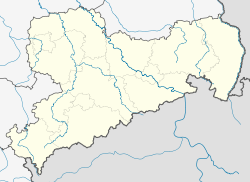Bahretal
show This article may be expanded with text translated from the corresponding article in German. (December 2009) Click [show] for important translation instructions. |
Bahretal | |
|---|---|
 Coat of arms | |
show Location of Bahretal within Sächsische Schweiz-Osterzgebirge district | |
 Bahretal | |
| Coordinates: 50°53′15″N 13°54′0″E / 50.88750°N 13.90000°ECoordinates: 50°53′15″N 13°54′0″E / 50.88750°N 13.90000°E | |
| Country | Germany |
| State | Saxony |
| District | Sächsische Schweiz-Osterzgebirge |
| Municipal assoc. | Bad Gottleuba-Berggießhübel |
| Subdivisions | 8 |
| Government | |
| • Mayor (2021–28) | Ronny Schietzold[1] |
| Area | |
| • Total | 36.47 km2 (14.08 sq mi) |
| Highest elevation | 370 m (1,210 ft) |
| Lowest elevation | 240 m (790 ft) |
| Population (2020-12-31)[2] | |
| • Total | 2,147 |
| • Density | 59/km2 (150/sq mi) |
| Time zone | UTC+01:00 (CET) |
| • Summer (DST) | UTC+02:00 (CEST) |
| Postal codes | 01819 |
| Dialling codes | 035023, 035025 |
| Vehicle registration | PIR |
Bahretal is a municipality in the Sächsische Schweiz-Osterzgebirge district in Saxony, Germany. It is situated in the northeastern foothills of the Erzgebirge (Ore Mountains), between Bad Gottleuba-Berggießhübel and Dohna. It consists of several small villages, situated in the valleys of the rivers Bahre and Seidewitz as well as on the heights between the valleys.
The municipality is named after the small river Bahre which flows through it. Its source is located 1.5 km north of Breitenau in Bad Gottleuba-Berggießhübel at 505 m. It flows into the Seidewitz near Zuschendorf. In order to prevent flooding, a retention basin was built between Borna-Gersdorf and Friedrichswalde-Ottendorf in 1970.
Municipality subdivisions[]
Bahretal consists of the following villages:
- Borna
- Friedrichswalde
- Gersdorf
- Göppersdorf
- Nentmannsdorf
- Niederseidewitz
- Ottendorf
- Wingendorf
History[]
Borna[]
Borna (German pronunciation: [ˈbɔɐ̯naː] (![]() listen)) probably belonged to the castle of Dohna at first. In the beginning of the 15th century it became part of the lands of Schloss Weesenstein. It changed hands quite often, between the owners of Liebstadt, Weesenstein, Gersdorf, Ottendorf, Krebs and Giesenstein in the subsequent years. In 1731, Borna was in the possession of the count Maurice de Saxe. The village church was first mentioned in 1388. It belonged to the parish of Pirna, and after the Reformation was introduced in 1539 to Liebstadt. In 1894, Borna built its own office.
listen)) probably belonged to the castle of Dohna at first. In the beginning of the 15th century it became part of the lands of Schloss Weesenstein. It changed hands quite often, between the owners of Liebstadt, Weesenstein, Gersdorf, Ottendorf, Krebs and Giesenstein in the subsequent years. In 1731, Borna was in the possession of the count Maurice de Saxe. The village church was first mentioned in 1388. It belonged to the parish of Pirna, and after the Reformation was introduced in 1539 to Liebstadt. In 1894, Borna built its own office.
Friedrichswalde[]
Friedrichswalde belonged to the Schloss Weesenstein. The church was first mentioned in 1311, and belonged to the parish of Pirna.
Gersdorf[]
Until the 17th century Gersdorf was divided into two villages: Obergersdorf (also: Gabel) and Niedergersdorf. They initially belonged to Dohna, but fell to the Margraves of Dresden. A manor was built in Gersdorf, and an artificial ruin was built around 1800.
References[]
- ^ Wahlergebnisse 2021, Freistaat Sachsen, accessed 10 July 2021.
- ^ "Bevölkerung des Freistaates Sachsen nach Gemeinden am 31. Dezember 2020". Statistisches Landesamt des Freistaates Sachsen (in German). June 2021.
External links[]
| Wikimedia Commons has media related to Bahretal. |
- Pictures of Borna[permanent dead link] Pictures of the Photothecque of the Sächsischen Landes- und Universitätsbibliothek Dresden
- Pictures of Bahretal
- Migratory pictures by Bahretal
- Municipalities in Saxony
- Sächsische Schweiz-Osterzgebirge
- Bezirk Dresden



